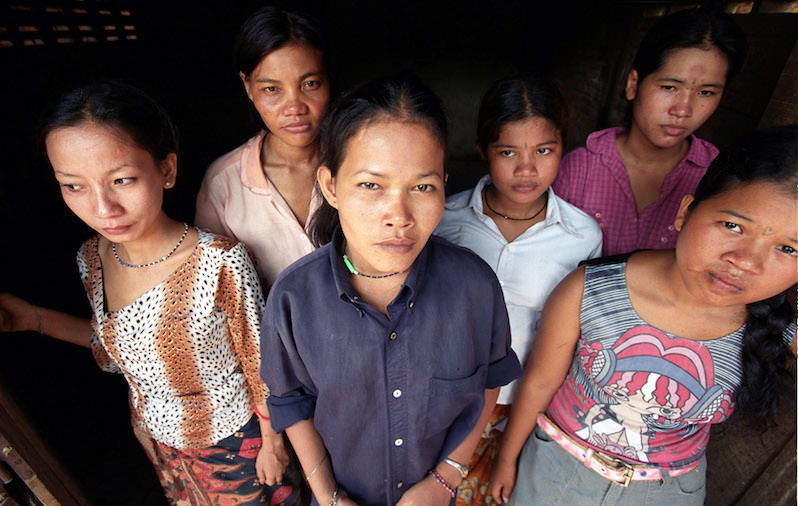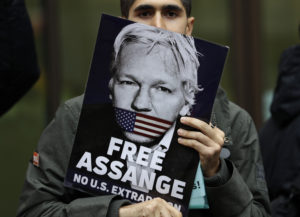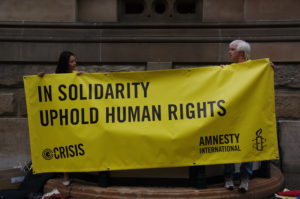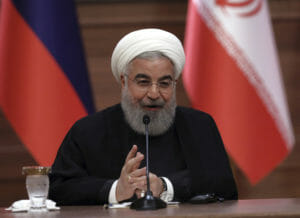A Union of Pimps and Johns
Though backers of "sex worker" unions claim the groups promote rights, the women I interviewed seemed anything but empowered. (Pictured, Cambodian prostitutes.) Prostitutes in Phnom Penh, Cambodia. (AP / David Longstreath)
Prostitutes in Phnom Penh, Cambodia. (AP / David Longstreath)
Prostitutes in Phnom Penh, Cambodia. (AP / David Longstreath)
During a trip to Cambodia in the summer of 2015 I came across a well-funded NGO that purported to run the largest union of “sex workers” in Southeast Asia. In Phnom Penh, I had arranged to meet a group of women who were, I was told, members of the “sex workers” union that had been founded by the Women’s Network for Unity (WNU). The WNU, which received funding by the Open Society Foundation, a multibillion-dollar fund set up by the investor George Soros, has a clear pro-prostitution agenda.
Our meeting was scheduled for 8 a.m. I brought with me a translator from another Cambodian women’s NGO. On arrival at the venue, I was surprised to find that a board member of the WNU had also decided to attend.
The women arrived, and, despite the fact that they had been out all night dealing with sex buyers and pimps, were warm, open and keen to talk about the violence and abuse they endure from sex buyers and police.
The board member interrupted them regularly, often speaking for them. I asked “What are the benefits of being in the union?” She answered on their behalf: “If the women are beaten up by the police, they are given legal training on their rights; if they are arrested, the WNU will provide food during the time they cannot work; and if one of the women dies, they will help to buy the coffin.” She concluded that “knowing their rights empowers them.”
The women seemed anything but empowered. One told me she could get out of prostitution only if she had $200 to buy formal identification papers, because this was the only way to secure legitimate employment in, say, the service industry or a factory. The other women joined in, saying this is also what they needed and wanted. They hated prostitution, they said.
WNU representatives claim they have 6,500 Cambodian “sex workers” on their books fighting for “sex workers’ rights.” The translator said that none of the women I met with used the term “sex work” to describe what they do, or “sex worker” to describe who they are. This language was used by the WNU. One of WNU’s aims is “to challenge the rhetoric around sex work, particularly that concerned with the anti-trafficking movement and the ‘rehabilitation’ of sex workers.” All the women asked me where they could get help to escape the hell they were in. Meanwhile, WNU board members and paid staff travel the region, speaking at “sex workers’ rights” conferences, distorting the voices of exploited women.
The prostituted women in Cambodia made it clear to me how much they hated prostitution. The board member said she had been at a regional conference with other “sex workers’ rights” activists and that “tens of thousands” of “sex workers” in Cambodia signed up to this so-called union. The women I spoke to had no idea that they were “sex workers’ rights” activists.
The experiences of these women were being used by WNU to promote the idea that unionization and decriminalization—a result of prostitution being formally recognized as labor—would solve all problems, despite the fact that the worst violence described by the women was by sex buyers. This NGO considered the concept of “sex workers’ rights” to be above and beyond the importance of the lives of the women themselves. I asked the board member if WNU was planning on raising money to help the women out of prostitution. She said “No.”
A documentary on prostitution in Cambodia titled “(Sex Workers Cry) Rights Not Rescue in Cambodia” is described as a collaboration between the 6,400-member WNU Cambodia and Paula Stromberg, the filmmaker.
The coordinator of WNU is interviewed for the film, and says: “WNU is an association of sex workers—adult women, men and transgender people. We choose to work. We are not victims. We are not trafficked. No one owns us. We don’t have pimps. No brothel owners enslave us. We do not want to be rescued.”
I found this statement quite difficult to process, having spent time in Cambodia speaking to prostituted women, pimps and bar owners.
In an email exchange with me, Stromberg wrote: “I would find it presumptuous for me as a Canadian to speak on behalf of the sex workers here in Cambodia. That is often the source of their problem—that everyone wants to speak about them, but few want to listen their voices.”
But as I had discovered in Cambodia, the WNU does speak for “sex workers,” literally putting words in the women’s mouths.
By the time I visited Cambodia I was very familiar with sex work lobbyists’ oft-adopted tactics of presenting pro-pimp organizations as “sex workers’ unions.” In 2002, the front page headline of a London newspaper read, “Sex workers to join trade union.” I had heard about the campaign, organized by pimps and their sympathizers in the U.K., to formally declare prostitution as “work,” but was nonetheless surprised that any credible trades union had bitten the bullet.
Britain’s third biggest union, the GMB, which was formed in 1889, had been persuaded by lobbyists for legalization of the sex trade that prostitution is a job, and that those selling sex deserve “worker’s rights.” In January 2002, to a fanfare of publicity, the Adult Entertainment branch was officially sanctioned by the GMB.
The Adult Entertainment branch began life as the International Union of Sex Workers (IUSW)—the brainchild of two academics who were not involved in prostitution. The IUSW—now operating mainly as a website—has never been a union, but a lobbying group for the decriminalization of pimping. Academics, sex buyers and pimps were welcomed as members of the IUSW, which eventually led one of its more leftist members to break ranks and spill its secrets to me.
In the early days, two gay men were the main spokespeople for the IUSW, making their rather unrepresentative voices dominant in the “sex worker’s rights” debate. One of them, Douglas Fox, a Conservative Party activist and co-owner of a large “escort agency” based in northeast England, was also an activist for Amnesty UK. In 2008, Fox proposed a motion for blanket decriminalization of the sex trade at the Amnesty International (AI) Annual General Meeting, a proposal that became international AI policy seven years later.
Thierry Schaffauser was prostituted on the streets of Paris as a teenager before moving to the U.K. Schaffauser became involved in “worker’s rights” campaigns, moved to London and joined the IUSW, soon rising to the role of president. But Schaffauser was unhappy with Fox being the public face of the organization, and, despite being warned not to speak to me about his views (other members were aware that I was researching the IUSW for for a news article), gave me an on-the-record interview. Partly as a result of this interview, Schaffauser was kicked out of the IUSW.
Lobbyists use the term “sex work” to include not just people directly selling sex, but also pimps, brothel owners, pornography producers and distributors, brothel security, sex trade propagandists, academics who research prostitution and even taxi drivers and advertisers.
The support of Amnesty International and other so-called human-rights-based organizations that advocate for decriminalization of the sex trade in the affluent West has a significant influence on sex trade policy and legislation in the Global South.
In the Netherlands, I have investigated the Red Thread, a now-defunct “sex workers’ rights” organization that masqueraded as a union until its collapse. Founded in 1984, it was funded by the Dutch government from 1987 with a mandate to combat HIV/AIDS. Red Thread closed in 2009, four years after losing its government funding.
At its height, however, the Red Thread had only 100 members out of an estimated 25,000 prostituted people across Holland. It never fought a case on behalf of a “worker” in court, and made no tangible difference to the “working” lives of prostituted individuals. It was a propaganda machine for legalization, and ensured that the Dutch were seen as “cutting edge” in their approach to complicated social problems. The Red Thread lost its governmental backing at the same time the international media began to report on evidence coming out of Holland that showed how legalization had been an unmitigated disaster.
But the damage had been done, and, in the true spirit of colonialism, the campaigners in the Global North that had run well-oiled propaganda machines, peddling the benefits of unionizing and legalizing the renting of women’s orifices, spread their influence to the Global South.
In India, the NGOs adopt the same tactic, and give red umbrellas—the symbol of the “sex workers’ rights” movement”—to the women standing outside the brothels waiting for trade. They want the women to march around Sonagachi, Kolkata—India’s biggest street prostitution zone—with their red umbrellas. “The pimps run these movements, and the prostituted women have no say in it at all,” says Ruchira Gupta, founder and president of Apne Aap Women Worldwide, an organization in India working to end sex trafficking.
“One day, in the late 1990s, there were female pimps seen around Sonagachi, speaking as ‘sex workers’ and claiming they were empowering the women in the brothels by forming unions to protect their rights in the workplace,” Gupta says. “But these women do not have any ‘rights’ in prostitution, and the ‘union’ was simply helping the pimps call for legalization.”Gregor Gall is an academic based in the U.K. whose specialty is the unionization of “sex work.” He has written two books on the topic, and it is clear that Gall has done his research. I asked Gall if he had come across any bogus, pimp-led “unions.” He admitted that he knew of one in India, and that it is likely they exist elsewhere in the Global South.
“There’s a union there [probably in Mumbai] for bar girls, meaning prostitutes,” Gall says. “It was set up by a non-sex worker … and there was evidence that the bar owners helped fund it because the bars were being closed down.”
Terms such as “collective” disguise the true nature of organizations that claim to be unions but in fact exist for the benefit of the johns, pimps and brothel owners.
SWEAT (Sex Workers Education and Advocacy Taskforce) is the leading pro-prostitution NGO in South Africa, founded in the early 1990s by two white “sex workers’ rights” activists, Shane Petzer, a gay male sex worker, and Ilse Pauw, a female clinical psychologist. Like other pro-prostitution NGOs, SWEAT uses the international language of human rights to argue for decriminalization.
“I looked at their leaflets, and saw cartoon drawings of happy looking women,” a woman who had recently exited the sex trade told me when I was in Cape Town in 2016, “and there were [speech] bubbles coming out of their mouths saying things like, ‘My union protects me,’ and ‘I can enjoy my job like anyone else,’ and it made me feel bad for [wanting] to leave prostitution. I thought it must be something wrong with me not to be enjoying it.”
SWEAT has been actively campaigning for decriminalization of the sex trade since 2000.
“To them it’s just [an] agency to sell sex, it is just work, ‘sex work,’ ” says Dudu Ndlovu, a gender studies student who was previously a volunteer at SWEAT. “To be a black woman and be prostituted in post-apartheid South Africa is to be reminded that you’re nothing, when we are now supposed to be liberated. SWEAT says that prostitution is your individual choice, and that there is no difference between my choices and yours,” Ndlova continues, “which is ridiculous, because you are a white woman living in the West and I am a black South African.”
Many of the so-called unions often appear to be set up as worker’s rights organizations in order to look attractive to funders.
George Soros’ Open Society, which funds the WNU in Cambodia, is one such group that looks kindly upon organizations claiming to help “sex workers” organize and achieve autonomy. The Open Society gives generously to SWEAT, and to other pro-prostitution NGOs in the Global South, such as those in Kenya, Cambodia and India.
Mickey Meji is a survivor of the sex trade and runs an exiting service in Cape Town for women who wish to leave prostitution. I ask Meji during my trip to Cape Town whether she believes it is possible to unionize the sex trade. “No,” Meji says, “because in South Africa the trade unions that we have, as far as I am concerned, represent people who are recognized as workers.” Meji is referring to domestic workers in South Africa, who are often ill-treated, underpaid and abused by employers, and, until the early 2000s, had no employment rights.
“People can unionize before they are legally recognized as workers,” Meji says. “We started having ‘house helps,’ and the employers decided what they wanted to pay and they [workers] decide if they want to accept it. Finally, through unionizing, they fought for the recognition of their rights. It was not a criminal offence to be ‘house help.’ That’s the difference; otherwise we’ll start having a union of smugglers and traffickers.”
I ask Meji: What if prostitution was legalized? She believes the stigma of being prostituted will never leave female prostitutes, even if there are no criminal penalties attached. “How do you unionize people in their absence?” she says. “When they march they wear masks; they want to be hidden and anonymous. How do you then unionize that? Because every industry that we know of, regardless of how gruesome it is or how dirty it is, people have taken ownership. But in the sex trade there is no real ‘pride’ from the women being prostituted.”
Janet M. Wojcicki, a white anthropologist based at the University of California, appears to consider black Africans such as Mickey Meji to be motivated by religious fundamentalism. In an article on the pro-prostitution movement in Gauteng Province, South Africa, in the early 1990s to 2000s, Wojcicke makes the extraordinary claim that, post-apartheid, “There is now a counter discourse opposing decriminalization, based on religion and on the argument that sex work is ‘un-African.’ ” The feminists opposed to the sex trade on the grounds that it is both a cause and a consequence of women’s inequality are neatly written out of the debate by Wojcicki. The sex trade can never be unionized because prostitution is not labor. Beatrix Campbell is a socialist, feminist and author of the classic text, “Wigan Pier Revisited” (1984).
“In all of the discourses about prostitution as work—is always—what the product is, who buys the product and what the relationship of this alleged purchaser is, in relation to power over and power to,” Campbell says. “That’s the other half of the discourse that needs to be explored. What do men think they’re doing when they are buying sex?”
The Russian Federation, which borders Europe and Asia, boasts a massive sex trade, and is known as a hub for pimps and traffickers.
Irena Maslova is the coordinator of Silver Rose, an NGO in Russia that campaigns for a legalized sex trade. Maslova told me, “I have 3 million sex workers behind me [across Russia].” Silver Rose was founded in 2003, and at the time was a small advocacy organization. By 2011 it was well funded, partly by George Soros’ Open Society, and expanded to 30 cities around Russia.
“Silver Rose is more a supporting role and promoting the idea of unionizing and getting together in order to stop the situation of violence and discrimination against sex workers,” Maslova tells me. I ask how many people in prostitution are in her union. “We have 3 million sex workers behind us,” she repeats.
Yet I have found no evidence of any employment tribunal finding, or any positive stories about the unionization of prostitution during my extensive research. Nor did any of the formerly prostituted women I interviewed from across the Russian Federation know of such a “union,” let alone say they’ve benefited from it.
The occupational hazards of regular workers are not remotely similar to those faced by women in the sex industry. Drug and alcohol misuse, violence in the “workplace,” unwanted pregnancy, sexually transmitted diseases and even death are daily concerns for many prostituted women, not the extraordinary issues they would be for regular workers. Prostituted women deserve human rights, not “workers’ rights.”
Janet Wojcicki claims that “… if one examines the language that is used in speaking and writing about sex work and sex workers in the post-apartheid period, it becomes clear that the movement to decriminalize sex work has incorporated the overall language of human rights that became enshrined in the African National Congress’ Constitution.”
But Nozizwe Madlala-Routledge, former ANC activist and founder of the feminist anti-prostitution (abolitionist) NGO Embrace Dignity, based in South Africa, has a very different take on this.
“We did not struggle to end apartheid to end oppression so that women can then be subjected to this kind of oppression and exploitation,” Nozizwe says. “Mandela would understand—I seriously believe that if we had gone to him to open his eyes, he would have been on our side, saying, ‘The Nation is not free while women remain in oppression.’ ”
Your support matters…Independent journalism is under threat and overshadowed by heavily funded mainstream media.
You can help level the playing field. Become a member.
Your tax-deductible contribution keeps us digging beneath the headlines to give you thought-provoking, investigative reporting and analysis that unearths what's really happening- without compromise.
Give today to support our courageous, independent journalists.






You need to be a supporter to comment.
There are currently no responses to this article.
Be the first to respond.